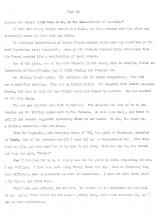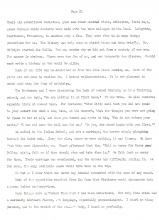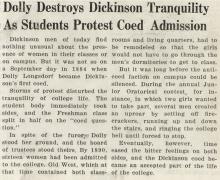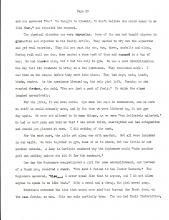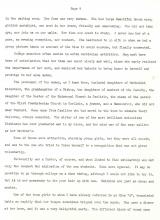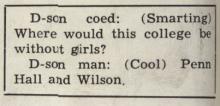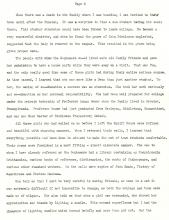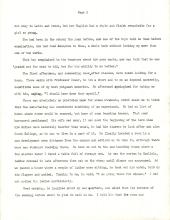"I was a Co-ed": Male Students Feared that Dickinson Would Become a Women's Institution
In her 1951 memoir, Elizabeth A. Low discusses the reaction of many male students to the institution of coeducation. According to Low, many male students rescented early female students. Low explains, "So far as I know there was never any scandal connected with the name of any co-ed. Much of the opposition resulted from the fear that Dickinson would degenerate into a young ladies seminary-type."
Dolly Destroys Dickinson Tranquility
An article in The Dickinsonian's celebration of the college's 90th anniversary entitled "Dolly Destroys Dickinson Tranquility As Students Protest Coed Admission" explains the 1884 furor over the admission of a coed on campus. When Dolly Longsdorf became the first coed, writes the author, the Freshman divided over the "coed question." Dolly and the Board of Trustees stood their ground, and sixteen women were admitted to the college by 1890. The college needed to remodel Old West in order to accomodate female students.
"I was a Co-ed": Female Students felt Alienated from College
In her memoir recounting her time at Dickinson, Elizabeth Low remembers how she felt alienated as an early female student at Dickinson College. Low wrote, "Dickinson stressed the idea that women were admitted through the front door, on the same footing as men. This was only partially true. The men had their fraternities, their old established societies, glee and other musical clubs, athletics, field days, games through which contacts were made with the best colleges in the land. They were free to do many things proscribed for us...
"I was a Co-ed": Treatment of Female Students by Male Dickinsonians
In her memoir recounting her time at Dickinson, Elizabeth Low remembers the treatment of female students by their male peers. She recalled that, "Some of these [female students] were attractive, charming young girls, but they were all co-eds, and woe to the one who tried to force herself to a recognition that was not given voluntarily." She further explains that "Personality was a factor, of course, and when linked to fine scholarship won not only the respect but admiration of male students. Some were ignored."
"I was a Co-ed": The Unofficial Dean of Early Female Students at Dickinson College
In her memoir recounting her experiences as an early female student at Dickinson College, Low recalls a fellow "co-ed" sophomore who "was more like a Dean than just another student." Though Low never mentions the woman's name, she explains that "She took her work seriously and co-education as her personal responsibility." Moreover, at an early party hosted by the sophomore "co-ed" she urged her fellow female students to sign a pledge proclaiming that "'We are set apart, destined for careers, we were superior and should not allow any entangling alliances to interfere with our life work." Unf
"I was a Co-ed": Housing for Early Female Students
Upon her arrival at Dickinson College in 1886, Elizabeth Low was shocked to find that no housing arrangements had been made for female students. Unlike their male counterparts, early female Dickinsonians were not permitted to live in dorms on campus. Moreover, the school had not found housing in town for the young women.
"I was a Co-ed": A Memoir by Elizabeth A. Low
In her 1951 memoir, Elizabeth A. Low recounts her time at Dickinson College as an early "co-ed." Low's memoir traces her career as a student in the preparatory school through to her latter years as a college student. Her story not only highlights Dickinson campus culture in the late nineteenth-century, but it also discusses what it was like to be an early female student at Dickinson College. Due to the large amount of information included in the piece, the document has been broken up into several posts with several themes including:
Faculty Discuss the Admission of Women, 1883
On May 24, 1883, the faculty discussed whether or not female students should be admitted to Dickinson College. Referencing the discussion regarding coeducation that took place two years earlier, the faculty decided that the conditions of the college grounds were now suitable for female students. Thus, the faculty decided to "recommend to the Board of Trustees that women be admitted to the classes of the college on the same conditions of men." Nearly all the faculty, with the exception of Professor Harman, voted in favor of coeducation.

